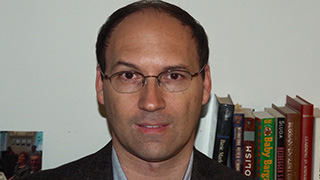Philosophy Professor Mark Couch Featured in Inside Higher Ed on Ethics Education
Wednesday, November 8, 2023
 Philosophy Professor Mark Couch was featured in Inside Higher Ed regarding the role and scope of ethics and ethics courses in an undergraduate education.
In the opinion piece,"Should We Require Ethics?," Professor Couch responds to and rebuts in part an article written by Steven Mintz,
a professor of history at the University of Texas at Austin.
Philosophy Professor Mark Couch was featured in Inside Higher Ed regarding the role and scope of ethics and ethics courses in an undergraduate education.
In the opinion piece,"Should We Require Ethics?," Professor Couch responds to and rebuts in part an article written by Steven Mintz,
a professor of history at the University of Texas at Austin.
Professor Couch writes:
In a recent article ("Should Colleges Engage in Ethics Education?," Oct. 19), Steven Mintz reflects on the role of ethics in an undergraduate education. He suggests that, given the recent controversial events involving Ukraine and Israel and students’ various reactions to them, we should consider making ethics a required course for students. While I agree with the broad suggestion he makes that ethics is important and should be taught more widely to improve students’ facility with moral discourse, I have some reservations about his particular proposals.
Couch further notes the primacy of philosophy and religion departments for the putative task at hand and how much of the material Mintz proposes to be covered in these classes is "already addressed, and addressed directly, in existing ethics courses that I teach" at Seton Hall each year. Professor Couch writes:
The issue concerns how one should implement such an approach at colleges and universities. Should we just require students to take an ethics course from the philosophy department? Should this be one course or two? Should we focus on general matters of analysis, or more applied areas of discussion? There are different ways to approach teaching the subject to students and Mintz canvases different ideas for doing this. He has particular worries about nonexperts teaching the subject, instructors advancing their personal views, courses lacking diversity of material, and how to teach the basic principles.
While Mintz is right to raise some concerns, I would demur at the suggestion that ethics should as a general matter be taught outside of philosophy departments (or Religion departments at Catholic universities, say). What struck me as interesting about Mintz’s discussion is how much of the material mentioned is already addressed, and addressed directly, in existing ethics courses that I teach. For instance, one of his suggestions is that university-wide courses should help students learn how "to think critically and reason morally" about different issues. This sentence looks like it’s taken straight out of the syllabus for my ethics course I teach every year.
Professor Couch, who published The Philosophy of Philip Kitcher (Oxford University Press, 2016) and has twice won the Provost's Faculty Scholarship Award at Seton Hall, concludes:
It wouldn’t take much effort for philosophy programs to create a broad, general ethics course to cover the kind of material Mintz wants, and it could include reflection on current events if it is needed.
While I’m not sure about the ethics of killing birds for sport, this would also be a way to kill two birds with one stone. Having students take an ethics course as part of their undergraduate education would help expose them to a central discipline in the liberal arts as part of their curriculum, encouraging precisely the kind of careful thinking and reasoning skills that are desired. Most ethics courses include discussion of "moral reasoning" as a specific part of the course. This is beyond teaching students about the content of ethics as it applies to a range of issues that affect them. Requiring such courses would be helpful for individuals trying to navigate the complexities of the world, and for society which surely needs an ethical citizenry. The study of ethics has a kind of timeless importance because it concerns no small matter but how we ought to live together.
Categories: Education
